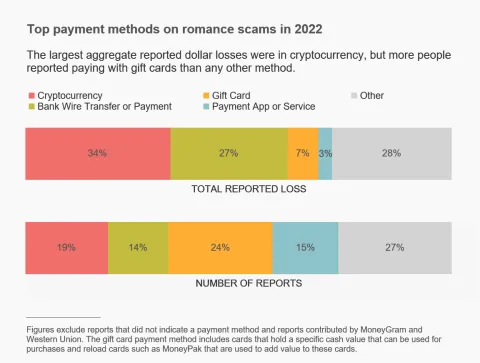
Protect Yourself Against Romance Scams
The Rise of Romance Scams
Americans are more connected than ever before thanks to social media and dating apps that allow us to stay in touch with old friends all over the world and to develop new relationships online. Yet, even with these new platforms, many of us report feeling lonelier than ever. As Americans increasingly go online in search of meaningful relationships, scammers are following suit. According to the Federal Trade Commission (FTC), in 2022 almost 70,000 people reported being a victim of a romance scam.
Romance scams are a type of confidence scheme. Scammers work to gain a victim's trust and then provide false information or misrepresentation to gain a financial benefit by relying on the compassion of the victim. These schemes are constantly evolving and becoming more innovative.
All age groups are vulnerable, though older Americans may be particularly vulnerable and targeted as they typically have more assets and are less familiar with online scams. According to the FTC's Protecting Older Consumers Report Protecting Older Consumers (2022-2023), older adults reportedly lost nearly $240 million to romance scams in 2022.
While the tactics used by romance scammers evolve with the times, the core tactic is the timeless art of social engineering – manipulating and influencing people to gain their trust. People of all ages are vulnerable as it is human nature to seek trusting relationships. Romance scams exploit this human quality mercilessly.
Red Flag Indicators of Romance Scams
You may be the target of a romance scammer if the person you are communicating with online shows any of these indicators:
- Claims they live, work or are traveling abroad.
- Lacks proper grammar, although they claim to speak English.
- Claims to be notably younger than you.
- Quickly professes love to you.
- Has a story that is inconsistent.
- Has a minimal online presence.
- Sends general photos (mostly fake/AI generated) of themselves traveling, shopping, or dining at luxurious locations.
- Sends or requests explicit photos or videos.
- Mentions the idea of meeting and being together soon.
- Provides periodic excuses for being unable to make a video call (e.g., Facetime).
- If a video call happens, you’re unable to see their face clearly.
- Requests to have conversations/texts be moved to a separate app (e.g., WhatsApp, Telegram).
Asks for money, often via non-traditional methods such as cryptocurrency or gift cards.- Asks if you’ve ever invested in cryptocurrency and/or foreign exchange market.
- Sends a business link of a cryptocurrency and/or foreign exchange trading platform.
- Is combative with you or tries to divert your attention when you question their intentions.
Lastly, if your bank contacts you to express concern you are being victimized, this is perhaps the most significant red flag that you are being targeted.

How Do Scammers Demand Payment?
As romance scammers continue to evolve, so do the methods they use to steal money from their victims. In 2022, 60% of all payments sent to romance scammers were via cryptocurrency or bank wires. Other common payment methods include gift cards (7%) and payment apps (3%). Scammers typically prefer these methods as they offer some level of anonymity and once funds are sent by the victim, the transaction can’t be reversed.
Tips to Avoid Losing Money to a Romance Scam
Although this can be an uncomfortable topic, make sure you, your family and your friends are familiar with romance scams. The more you know about these scams, the better prepared you are to prevent being a victim. Scammers are looking for easy targets. Don't be an easy target.
- Be suspicious of unsolicited phone calls and text messages. Don’t answer calls or texts from any unknown numbers. Never give out personal information over the phone or text.
- Let calls go to voicemail and don’t be afraid to hang up. Recognized numbers could also be a scam due to IP spoofing. If it's important, the person will leave a message or follow up with a text.
- Don't respond to unknown text messages and block/report them as spam.
- If you receive a call or text from a reputable entity (e.g., health provider, bank, company), respond using contact information you know is legitimate. Go to their official website for contact and support information.
- Limit what you share online. Scammers can use details shared on social media and dating sites to better understand and target you to form a connection and take advantage of what is going on in your life.
- In addition, requests for inappropriate photos or financial information could later be used to extort you.
- Go slowly and ask questions. Creating a false sense of urgency is a fundamental tactic of social engineering. Don’t let the individual rush you to make a decision. Be wary of sending money, bank account information, personal photos or other sensitive personal information to someone you’ve never met in person.
- Do your research. Research the individual’s photo and profile using online searches to see if the image, name, or other details have been used elsewhere.
- Keep it on the platform. Many times, scammers will push to move the conversation off the dating or social platform. Generally, they request to text or email. This is to avoid the detection controls in dating website chats.
- Listen to your gut. If the individual seems too good to be true, talk to someone you trust about it.
- Don’t send money or cryptocurrency. Never send money to anyone you have only communicated with online or by phone. If you meet someone on a dating site, app, or social media and they want to show you how to invest in crypto, or ask you to send them cryptocurrency, it is a fraud.
Think You’ve Been Scammed?
Romance scammers are highly skilled manipulators who exploit our emotions. They often work in organized groups and use well-rehearsed scripts to deceive their victims. Anyone can fall victim to a romance scam, regardless of age, education or intelligence.
If you believe you have fallen victim of a romance scam:
- Do not blame yourself.
- Falling for a romance scam is not a sign of weakness, but rather a result of sophisticated and manipulative tactics. You are a victim, and it is not your fault.
- Stop communicating with the individual immediately.
- Talk to someone you trust and describe what’s going on.
- Notify the website or social media platform where the scammer first made contact.
- This can lead to the scammer’s profile being removed, protecting other potential victims.
- Report the incident to local law enforcement.
- Submit a fraud complaint with the Federal Trade Commission.
- Regularly check bank and credit card statements for any unusual activity.
- If personal financial information has been shared, consider freezing credit reports or changing account details.
Romance Scams and Human Trafficking
Unsuspecting Americans are not the only victims in these online fraud scams. In many cases, the perpetrators themselves are victims of human trafficking, who are forced to work with no pay, little sleep, and no freedom to leave.
The global COVID-19 pandemic left many people financially devastated and desperate for hope. In many cases, victims respond to online ads promising employment overseas with high salaries. People with certain skillsets are especially targeted, such as those with English and/or Chinese language proficiency. Then they are deceived and arrive at a secure compound comprised of “fraud dens” that are run by Transnational Criminal Organizations (TCO). Their passports are confiscated, and they are forced to pay back their "debt" by working long hours. They also face physical and sexual abuse, restrictions on movement, and starvation.
Many of these "fraud dens" are in countries with pervasive government and law enforcement corruption. However, online fraud scams are highly profitable, and this crime model is quickly spreading throughout the world.
How HSI Combats Romance Scams
Most romance scams originate overseas and are often run by TCOs, which pose significant multi-jurisdictional challenges to U.S. law enforcement.
To combat TCOs involvement in romance scams, HSI partners with other U.S. agencies including:
- U.S. Secret Service
- U.S. Customs and Border Protection
- DHS Office of the Inspector General
- DHS Office for Civil Rights and Civil Liberties
- Federal Bureau of Investigations
- U.S. Postal Inspection Service
- Internal Revenue Service
- Commodity Futures Trade Commission
- Federal Trade Commission
To combat TCOs, HSI and its partner agencies have worked with the Department of Justice to produce a coordinated enforcement and prosecution effort. This effort involves law enforcement working jointly with prosecutors, our foreign law enforcement partners and the financial industry. This collaboration has led to a more cooperative law enforcement effort that will eventually lead to the disruption and dismantlement of the TCOs that victimize our citizens.
HSI identifies and seizes assets derived from romance scams, disrupting criminal enterprises and taking away their profits. When possible, working in conjunction with the U.S. Attorney's Office and foreign governments, HSI will return funds to victims in restitution. Oftentimes, TCOs are engaged in many types of illicit financial crimes, not just romance scams.
HSI leads the DHS Center for Countering Human Trafficking (CCHT) to advance counter human trafficking law enforcement operations, protect victims and enhance prevention efforts. CCHT works jointly with other headquarters components to further enhance investigative efforts and identify TCOs using fraud scheme to exploit and traffic individuals for financial gain.
HSI and its partner agencies work to spread awareness of deceptive employment ads and online fraud scams. Our Victim Assistance Program provides a critical resource to HSI investigations and criminal prosecutions. We work to help victims who have escaped from "fraud dens" and identify the perpetrators to shut down the TCOs and assist victims of human trafficking.


